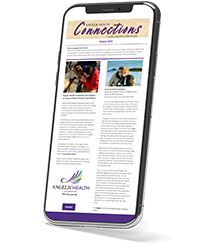Is the Weather Making You Sick?

What’s the weather? Rainy, sunny, hot and humid, or cold and dry; the weather is the common topic of conversations regardless of where you live or what you do. But for those with Chronic Obstructive Pulmonary Disease (COPD), asthma, other respiratory or cardiac conditions, the weather can play a large role in how well they are going to feel that day.
“Extreme temperatures, both cold and heat, contribute to more respiratory complications for sure,” said Patricia Newton DNP, RN, APN, FNP-BC a palliative care nurse practitioner with Angelic Health. “During the very cold and very hot and humid months we see more COPD exacerbation and more respiratory difficulties resulting in individuals using their rescue inhalers and/or nebulizers more frequently and going to the hospital more often.”
Cold and dry weather can worsen symptoms of respiratory issues, causing shortness of breath, coughing, and wheezing. Pollen and air pollution are other factors that may be a trigger for those with lung issues, especially asthma. Excessive heat and humidity increase strain on the heart which of course can worsen any cardiac condition.
It’s not only the outside weather that can exacerbate lung conditions, but also indoor air quality in all seasons and too much humidity can cause indoor mold which can wreak havoc on a person’s health. Air conditioning removes humidity from the air and adds cold air to the environment, which in turn, can contribute to COPD exacerbation. Keeping the air conditioner at a moderate temperature is safer than a colder temperature.
While it may be nice to sit outside under the stars by a campfire or back yard fire pit both smoke and fumes emitted can cause safety and health issues for some. “Those with COPD and other lung issues should be especially cautious,” advises Newton warning those on portable oxygen to avoid sitting near a flame.
Newton advises anyone who is concerned about air quality in their home to use a good air purifier and keep it properly cleaned and maintained. Dehumidifiers need regular attention, to be emptied, and cleaned so as not to increase the growth of mold.
Wearing masks as a filter for air quality is not recommended for everyone. “Mask quality varies, and some find the masks themselves irritating,” she warns. However, consult with your healthcare professional about what is best for you.
While you cannot control the weather, you can monitor it, be mindful of your triggers and plan for extreme conditions.
